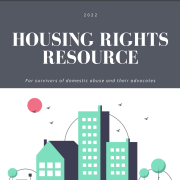Teaching resources
Law for Life and its award-winning information service Advicenow have developed free teaching guides for anyone wishing to develop some form of public legal education (PLE) within a charitable, work, or educational setting.
Who are intermediaries?
Intermediaries are people who work in organisations whose service users are seeking help to deal with problems which may have legal dimensions. The intermediaries may be paid staff, students, volunteers or trustees and are unlikely to have any legal or advice training. This training aims to help them to spot a legal issue, know when the law can help, know how to find out what rights apply, and know where to get help. They can then help service users to organise and plan how to deal with their case, help with the practical steps of dealing with a law-related issue, build their confidence, support them to communicate effectively, and be organised. This training can also be used to support those who currently provide legal advice, but would like to build skills to teach public legal education.
What is legal capability?
At Law for Life we think about legal capability as the personal attributes that someone needs in order to deal effectively with law-related problems. These capabilities include or encompass knowledge, skills and attitudes. The concept of legal capability is explicitly about empowerment. It aims to transform, through education, peoples’ knowledge and understanding of their legal rights and their capacity and willingness to enforce them.This is distinct from and goes beyond having specific knowledge of legal systems and processes. If you have legal capability it means you can identify potential law-related problems as they arise, find information to help you understand the problem, and take steps to deal with it.
Any questions about the teaching guides can be directed to info@lawforlife.org.uk.
A practical guide to public legal education (PLE)
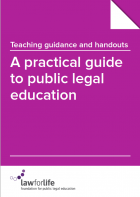
Law for Life’s A practical guide to public legal education (PLE) explains the nature and value of public legal education and provides some simple techniques and materials through which people’s understanding about the law and their skills to use legal remedies might be developed.
It is divided into four sections:
Section one: explains the nature of public legal education: what it is – and what it is not.
Section two: indicates ways of developing and teaching public education.
Section three: provides examples and links to some of the materials already developed by Law for Life, with guidance on ways in which they may be used to develop standalone courses.
Section four: offers some good practice ideas when evaluating public legal education courses.
We hope that this guide will provide guidance and materials for anyone wishing to develop some form of PLE within a charitable, work, or educational setting.
To download your copy, follow this link: A practical guide to public legal education or visit our Publications page.
Finding out about the law: Where to get information and help
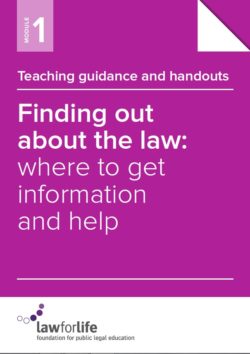
Finding out about the law:
Where to get information and help
This module has been designed to be taught as part of a four module package but you can easily adapt it in order to teach it independently.
In this session you will introduce the group members to a number of legal ideas that are helpful in understanding how the law works, particularly in relation to consumer contracts. In the second part of the session you will help group members find and use reliable online sources of legal information.
The aim of this session is to help group members:
• understand two basic legal concepts, contract and statute;
• apply the law in particular legal situations;
• identify accessible and reliable sources of online legal information;
• use these resources to find information about specific legal scenarios.
To download your copy, follow this link: Module 1: Finding out about the law
Housing disrepair: Assessing courses of action and developing communication skills
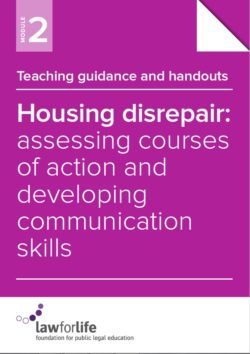 Housing disrepair:
Housing disrepair:
Assessing courses of action and developing communication skills
This module has been designed to be taught as part of a four module package but you can easily adapt it in order to teach it independently.
This session deals with practical legal questions of disrepair and the relationship between landlord and tenant. It provides the opportunity to develop and practice key communication skills and the ability to identify and assess different courses of action for dealing with disrepair problems.
The aim of this session is to help group members:
• understand the basic rights and responsibilities of landlords and tenants in relation to disrepair,
• assess and develop a course of action for dealing with disrepair problems,
• recognise and develop effective communication skills,
• identify sources of support for disrepair problems.
To download your copy, follow this link: Module 2: Housing disrepair
Employment and discrimination Developing confidence and getting organised
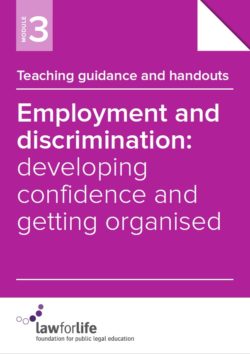 Employment and discrimination
Employment and discrimination
Developing confidence and getting organised
This module has been designed to be taught as part of a four module package but you can easily adapt it in order to teach it independently.
This session deals with practical legal questions of employment law, specifically to do with discrimination issues and reasonable adaptations. It provides the opportunity to develop specific skills around getting organised in order to manage law-related problems and foster the personal skills, such as confidence and motivation, necessary to persevere.
The aim of this session is to help group members:
• understand the basic legal rules of discrimination in the context of employment,
• identify and develop key organisational skills to effectively manage law-related problems,
• identify capability needs and ways to support clients,
• evaluate and devise a strategy for developing the personal skills necessary for persevering with a law-related problem.
To download your copy, follow this link: Module 3: Employment and discrimination
Section 21 eviction notices: learning about the process and developing strategies for dealing with private rented housing problems
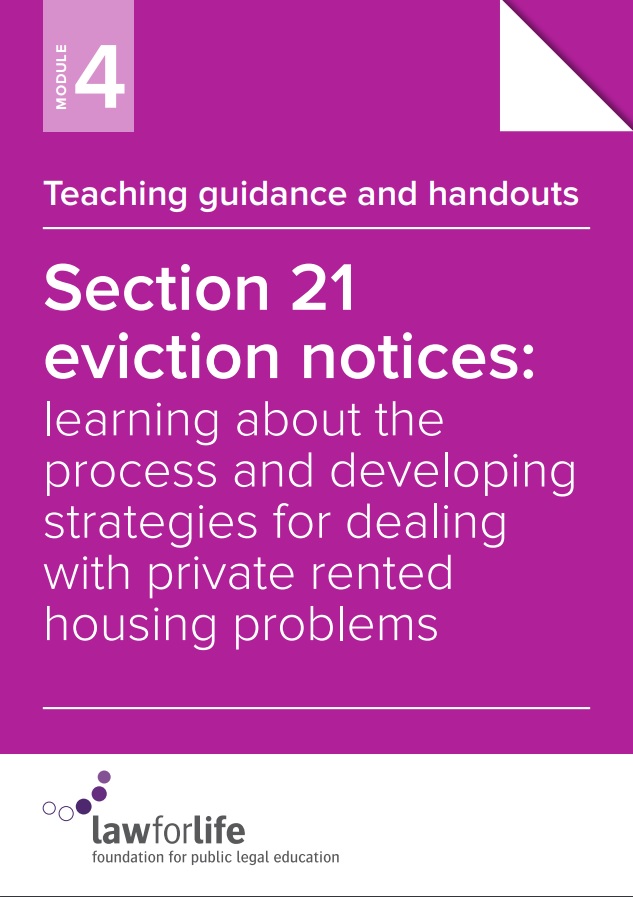 Law for Life's teaching guide': Section 21 eviction notices: learning about the process and developing strategies for dealing with private rented housing problems is intended for use with intermediaries in community organisations and focuses on the development of legal capability. We have used these materials with particular groups, such as migrants or people in receipt of social security benefits, who are more likely to be affected by poor housing conditions and unlawful evictions, and are least likely to report disrepair or rogue landlords.
Law for Life's teaching guide': Section 21 eviction notices: learning about the process and developing strategies for dealing with private rented housing problems is intended for use with intermediaries in community organisations and focuses on the development of legal capability. We have used these materials with particular groups, such as migrants or people in receipt of social security benefits, who are more likely to be affected by poor housing conditions and unlawful evictions, and are least likely to report disrepair or rogue landlords.
To download your copy, follow this link: Module 4 Section 21 eviction notices or visit our Publications page.
Homelessness application process - flowchart
Created as part of the Housing Project, ran by Law for Life and funded by Trust for London, this infographic details different duties your local authority is responsible for. The infographic also links to various elements of our Advicenow housing guides to elaborate on the homelessness application process. To see full size infographic click HERE or on the image below.
How to support homeless people and those threatened with homelessness
This guide is aimed at social prescribers, support workers, link workers and others who support people who are homeless or at risk of homelessness. It provides information on what types of help people should receive and how to deal with local authorities’ housing departments when making homelessness applications. It also includes specific information on vulnerability letters.
How to support homeless people and those threatened with homelessness
